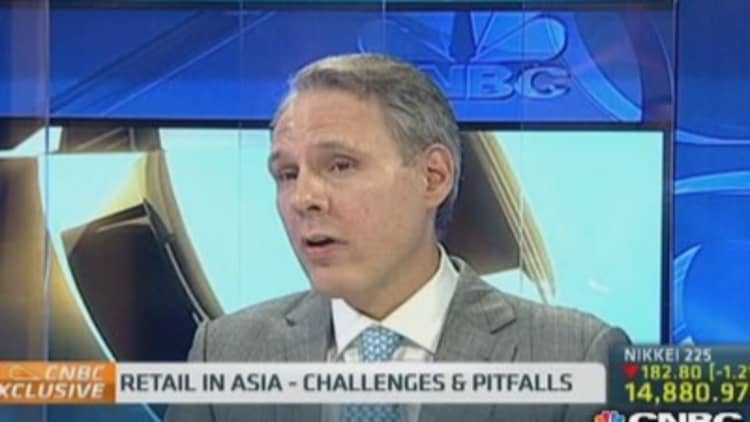After a long, hot spring of industrial unrest, the Chinese government is attempting to bring closure to the last in a series of high-profile labor disputes involving some of the world's most powerful multinational companies.
On June 12, neighbourhood committee cadres visited the homes of 69 Walmart employees who remain locked in an arbitration case with their former employer in Changde, a small city in Hunan province
The neighbourhood officials, who enforce Chinese Communist party diktats at street level, carried pictures of the workers and conveyed a simple message to them and their families: don't interfere in Walmart's removal of goods from the store, which closed in March, and accept the retailer's enhanced settlement offer of Rmb3,000 ($480) each for "legal fees" incurred during the three-month dispute.
Over recent months, a series of high-profile industrial actions at multinational employers such as IBM and Yue Yuen Industrial, one of the world's largest shoe manufacturers, have been resolved. Other workers charged with disturbing public order have been released, in contrast to the harsh treatment of human and legal rights activists like Pu Zhiqiang.
Read MoreWal-Mart takes on the Chinese government
Chinese officials say they support neither side in the Walmart dispute in Changde and insist that the retailer's former workers, who are demanding greater compensation, are free to fight for their rights through legal channels. But as evidenced by the neighbourhood committees' interventions last week, the government is keen to bring closure to what has been a long, hot spring of industrial unrest.
The Yue Yuen Industrial strike, over alleged underpayment of social security benefits, involved tens of thousands of workers, illustrating the potential power of China's fragmented but rapidly evolving labor movement.
The country's only officially sanctioned union, the normally reticent All China Federation of Trade Unions, has traditionally urged workers to seek compromise in disputes with management, even if its members are unhappy with the outcome. The Changde dispute has attracted global attention in large part because of the unusually pugnacious approach taken by the store's ACFTU branch.

"With the economy slowing and workers more conscious of their legal rights, labor disputes will become even more common," says Pang Kun, a labor rights lawyer not involved in the Walmart case. "But the internal political climate and the government's emphasis on 'stability maintenance' means that worker protests are likely to be suppressed as soon as they arise."
More from the FT:
Li & Fung's strategy to make the maths work
Analysis: China labor activism
China's Canton Fair hit by ecommerce rise
The Changde case came to a head at an arbitration hearing on May 27 when the head of the outlet's union, Huang Xingguo, squared off against Walmart's lawyers from King & Wood Mallesons, an elite Chinese law firm. The retailer had offered the affected workers one month's pay for every year served, plus another month's salary. About sixty of the store's original 130 employees have accepted the offer.
Mr Huang proudly wore his employee badge at the hearing, which had been moved to a large classroom at a local technical college to accommodate the 69 holdouts. Most of them were women who came dressed in their red Walmart shirts. "Walmart says it values its employees," Zhou Qun, one of the employees, said as she waited for the session to begin. "But as soon as they don't need you, they just discard you."
Ms Zhou and her colleagues formed a kind of Greek chorus through the three-hour long hearing, which was attended by the Financial Times. They murmured or chuckled appreciatively when they felt that Mr Huang, aided by two lawyers, had scored rhetorical points in their debate with Walmart's high-priced legal team, and sometimes hissed at their opponents' arguments.
Read MoreWal-Mart toopen up to 110 new China stores by 2016
Walmart insists that it strictly adhered to its legal obligations in closing about 20 underperforming outlets – part of a restructuring in which it also intends to open another 110 stores and hire 19,000 more workers over three years. Part of the workers case hinges on a technical argument about whether the outlet had been "closed" or "dissolved". Walmart, Mr Huang and his lawyers argued, originally used the latter term, which they say means the store's assets should be seized by the government and auctioned off.
For its part, Walmart argued that Mr Huang's chapter cannot bring a collective action case against it because almost half of the store's workforce accepted the retailer's original settlement offer. After the hearing, Walmart's lawyers declined an interview request.
The retailer later offered the holdouts an additional payment of Rmb3,000 each for "legal fees". The distinction is important because if Walmart simply made a higher settlement offer, workers at all the closed stores who accepted less could argue that they should be paid more as well.
Mr Huang and his colleagues in arms rejected the revised offer. "So long as there is one worker who wants to continue this fight, we will represent him," he said. "If necessary, we will take it all the way to the Supreme People's Court in Beijing."
- Additional reporting by Wan Li

